| Srl | Item |
| 1 |
ID:
112996


|
|
|
| 2 |
ID:
122079
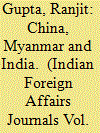

|
|
|
| 3 |
ID:
120731
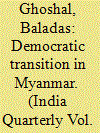

|
|
|
|
|
| Publication |
2013.
|
| Summary/Abstract |
Myanmar, earlier known as Burma, is on the cusp of a transition-a process that has to pass through formidable challenges and whose outcome is still quite uncertain. Five decades of military misrule have turned Myanmar that at one time used to be the richest into the poorest in South-east Asia and in a state of decline with an abysmal record in political, economic and social spheres. To recover from that decline, the country will need good governance, political reconciliation between the government and the opposition, between various ethnic groups and the government and the removal of long years of neglect of their aspirations and empowerment, between those opposition groups that remained within the country and the exiled groups, and finally, the goodwill and support of the international community. Aung San Suu Kyi, Myanmar's democratic leader, has joined the political process and has become the leader of the opposition in the army-dominated parliament. She also faces formidable challenges, as she has to reconcile the wide expectations of people who still consider her as a political activist fighting for the cause and the imperatives of being a constructive politician who has no other option other than pragmatic reconciliation. Relations with China are one issue that will also impinge on future of democracy in the country.
|
|
|
|
|
|
|
|
|
|
|
|
|
|
|
|
| 4 |
ID:
114363


|
|
|
| 5 |
ID:
112994
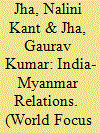

|
|
|
| 6 |
ID:
151883
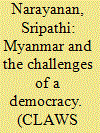

|
|
|
| 7 |
ID:
095121
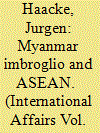

|
|
|
|
|
| Publication |
2010.
|
| Summary/Abstract |
Following the adoption of a new constitution by national referendum, Myanmar's military junta is set to organize multiparty elections in 2010. Not least to influence Myanmar's leadership, with regard to the conditions Washington believes necessary for credible elections, the United States announced in September 2009 that it would embark on a new approach towards Naypyidaw. This will focus on a high-level dialogue while keeping existing sanctions in place. The Obama administration has asked the Association of Southeast Asian Nations (ASEAN) to support this new approach. Against the backdrop of the deep divide between the ruling generals and Aung San Suu Kyi, and the continued conflict between Naypyidaw and armed ethnic nationalities, this article asks: How strong is ASEAN's record when it comes to influencing the State Peace and Development Council (SPDC) in relation to matters of national reconciliation and political transition? What factors explain ASEAN's approach towards Myanmar? What prospect, if any, is there that ASEAN states can influence Myanmar's political developments before the 2010 elections? The article argues that ASEAN has not moved beyond a collective criticism which aims to induce Naypyidaw to respond positively to the demands of its international detractors. ASEAN's norms, different political identities and geopolitical interests coupled with the SPDC's prickliness have limited the consensus on Myanmar. Naypyidaw's calculations about relations with Washington, rather than ASEAN's 'enhanced interactions' with the military government, and domestic political dynamics are likely to be the crucial determinants of further developments in the context of the 2010 elections.
|
|
|
|
|
|
|
|
|
|
|
|
|
|
|
|
| 8 |
ID:
094494
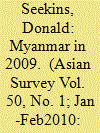

|
|
|
| 9 |
ID:
115390
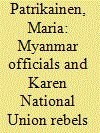

|
|
|
| 10 |
ID:
181355
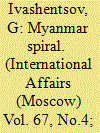

|
|
|
|
|
| Summary/Abstract |
ACCORDING to the ancient Greek writer and historian Xenophon, the development of history is cyclical. This idea is almost 2,500 years old. Is it applicable to the current situation in the Republic of the Union of Myanmar?
|
|
|
|
|
|
|
|
|
|
|
|
|
|
|
|
| 11 |
ID:
178407
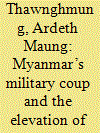

|
|
|
|
|
| Summary/Abstract |
The military overthrow of Myanmar’s elected government in February 2021 has again thrown into upheaval the troublesome relationship between civilian politicians and armed forces that has plagued the country since its first military coup in 1962. t has also brought back into view the relationship between Myanmar’s Bamar majority and the country’s ethnic minorities, a fractious issue that has long been subject to band-aid and patchwork solutions that skirt around the deeper causes of minority disaffection. Myanmar’s minority groups have long-standing grievances against the repression and brutality of the Bamar-dominated military and feel marginalized. Their attitude to the Bamar-dominated National League for Democracy (NLD) government of 2016-2021, led by Aung San Suu Kyi until her ouster and arrest, was one of despair at the continuing death and destruction brought by civil conflict, dismay at the silence of political leaders on the plight of civilians displaced by war, and anger at the quasi-authoritarian policies by the civilian administration. These dynamics have helped determine allegiances in the ongoing protests against military rule, pressed the ousted government into changing its policies to better reflect minority aspirations, and will likely transform Myanmar’s political landscape in a manner that would have been inconceivable before the coup.
|
|
|
|
|
|
|
|
|
|
|
|
|
|
|
|
| 12 |
ID:
167802
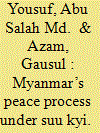

|
|
|
|
|
| Summary/Abstract |
Before British occupation in Myanmar, the then Burma, the frontier areas of the country enjoyed autonomy under the dynastic rulers. The British colonials consolidated the country under a central rule. When anti-British movement started in Myanmar, the ethnic groups of frontier areas reclaimed their autonomy. The unanimous leader of Myanmar’s independence movement General Aung San desired an integrated Myanmar and reached in an agreement naming Panglong Agreement 1947, where all the stakeholders agreed to secure the identity and status of all ethnic communities and to develop a federal system where every community can get equal status. The assassination of General Aung San and subsequent military takeover of 1962 pushed the country towards a long-term ethnic conflict. The military rulers failed to accommodate demands of the ethnic communities and a policy of segregation undermined the nationality of ethnic groups. After seven decades, Aung San Suu Kyi’s arrival to power in 2015 raised new hope for reconciliation and the elected government of Myanmar started new peace process. But, the longstanding mistrust and conflict between the military and the ethnic groups are making the process difficult. Present study identifies the fault lines of new peace process and finds that the deficit of trust, the point of non-secession principle, disagreements on the incorporation of ethnic soldiers in the national military and debates on constitutional amendments are the main challenges towards a peace agreement between the government and ethnic communities of Myanmar.
|
|
|
|
|
|
|
|
|
|
|
|
|
|
|
|
| 13 |
ID:
127504


|
|
|
|
|
| Publication |
2013.
|
| Summary/Abstract |
The recent reforms in Myanmar were not brought about by Western sanctions or some contingent event, but rather planned well in advance,. For there is more continuity than change in Myanmar's political system, which is dominated by the practitioners of national power-the army and the bureaucracy. Of course there are new actors, principally Aung San Suu Kyi and the party she leads, the NLD. Yet the reality remains: state security has to be maintained. Rebalancing with ASEAN, India and now the West is helpful in terms of independence vis a vis China. This is not an invitation to the West to attempt to subvert the existing order.
|
|
|
|
|
|
|
|
|
|
|
|
|
|
|
|
| 14 |
ID:
149177
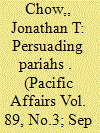

|
|
|
|
|
| Summary/Abstract |
Myanmar’s liberalizing reforms since late 2010 have effectively shed the country’s decades-long “pariah state” status. This article evaluates competing explanations for why Myanmar’s leaders made the strategic decision to pursue reform and opening. We examine whether the strategic decision was motivated by fears of sudden regime change, by socialization into the norms of the Association of Southeast Asian Nations (ASEAN), or by the geopolitics of overreliance on China. Drawing on newly available materials and recent field interviews in Myanmar, we demonstrate how difficult it is for international actors to persuade a pariah state through sanctions or engagement, given the pariah regime’s intense focus on maintaining power. However, reliance on a more powerful neighbour can reach a point where costs to national autonomy become unacceptable, motivating reforms for the sake of economic and diplomatic diversification.
|
|
|
|
|
|
|
|
|
|
|
|
|
|
|
|
| 15 |
ID:
112993
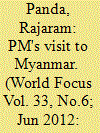

|
|
|
| 16 |
ID:
099946
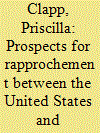

|
|
|
|
|
| Publication |
2010.
|
| Summary/Abstract |
Held in a virtual state of suspended animation for the past twenty years, US relations with Myanmar have received fresh scrutiny as the country undergoes a political transition from martial law to quasi-parliamentary governance. As a result, the Obama administration has fashioned a new policy of pragmatic engagement to balance US sanctions against Myanmars military regime, to reinvigorate Americas relations with ASEAN and to create a more flexible policy structure for fashioning US responses to a variety of possible outcomes in Myanmars transition process.
|
|
|
|
|
|
|
|
|
|
|
|
|
|
|
|
| 17 |
ID:
118874
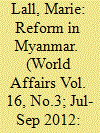

|
|
|
| 18 |
ID:
115910
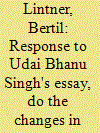

|
|
|
| 19 |
ID:
116206
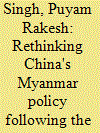

|
|
|
| 20 |
ID:
161075
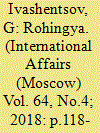

|
|
|
|
|
| Summary/Abstract |
INTERETHNIC CLASHES are not a rarity for many Asian and African countries, and foreign media outlets do not sensationalize them. However, what has happened around the Rohingya community in Myanmar in recent months has largely broken with this pattern. TV screens and newspaper pages have been filled with reports of the purported genocide of the Rohingya perpetrated by the Myanmar authorities: thousands of dead Rohingya, hundreds of burned villages, and thousands of refugees fleeing to Bangladesh. Tough statements were made by leaders, public and religious figures in a number of Muslim states, and the issue was raised at the UN. On certain days, the Rohingya issue in the media was so off the scale that it almost completely eclipsed the situation around Korea, fraught with nuclear conflict.
|
|
|
|
|
|
|
|
|
|
|
|
|
|
|
|